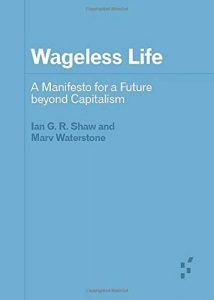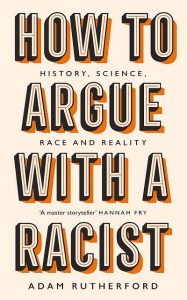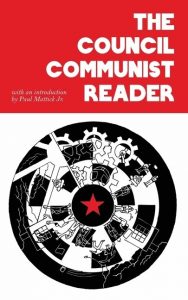Book Reviews
 Misleading title
Misleading title
Wageless Life. A Manifesto for a Future beyond Capitalism. By Ian G.R. Shaw and Marv Waterstone. University of Minnesota Press, 2020. 131pp.
People who advocate a moneyless, wageless society of free access to all goods and services, as members of the Socialist Party do, would be likely to see in the title of this book an expression of support for this idea and expect to find in it details of how life in that ‘wageless’ society would be organised. However, the first few pages would make them aware, and perhaps disappointed, that this is not what is meant by the title. They would realise that ‘wageless life’ is not a way of describing the basis on which a post-capitalist society would be organised, but rather a reference to what the authors perceive as an ongoing development within capitalism, that is its inability to offer its populations wages to enable them to live.
That contention is neatly summed up by the book’s statement that ‘we live in a world sculpted by money but populated by the moneyless’ and is repeated in various different ways time after time throughout its pages. This wageless-ness of people due to their being surplus to capitalism’s requirements is seen as having begun seriously in the 1970s and as having intensified over the decades since, especially with the increased power of finance capital (so-called ‘financialisation’), so that now, we are told, ‘workers bounce between short-term jobs, zero-hours contracts, and other forms of induced precarity’ and most face ‘a jobless future’. As the authors see it: ‘Some of us are virtual paupers’, other are actualized paupers – but pauperism is our shared condition of oppression.’
Some may see this as an over-dramatic statement of the reality of advanced capitalism. Certainly other anti-capitalist commentators have taken different views of the effects of automation on the job market and the lifestyles of its wage workers. It should also be borne in mind that, even if the current development of capitalism may seem to be inevitably leading to long-run technological unemployment or at least wage stagnation and a proliferation of ‘bad jobs’, capitalism in its history has gone through numerous phases and crises and on the whole has managed, even if in an extremely uneven and irregular way, to actually improve living standards and conditions for large numbers of its wage slaves. In other words, current ‘trends’ are not necessarily long-term ones.
None of this however takes anything away from the authors’ thesis that we are ‘fundamentally pauperized under capital’, a system they characterise as ‘a war of profit against life on earth’. In capitalism we all scramble to sell our energies, ‘under conditions of duress and unfreedom’, as the authors put it, being denied our ability to control how we work, and so suffering an alienation that separates us ‘from the material conditions that enable humans to flourish’. They are undeniably correct to say that ‘we sell our time – our existence on planet earth – to somebody else, leading to a global division between those who sell their time and those who buy it’. And, among all this is their observation – especially striking and pertinent in view of the recent sporting events in Europe – that ‘distraction technologies and the entertainment industry sell us meaningless thrills to patch over the pain’. Their picture of modern capitalism is completed by a number of powerfully expressed reflections on the effects of capitalism on human psychology such as that ‘the keystone of capitalist realism remains the utter worship of paid work’, that capitalism ‘thrives on producing docile subjects who are alienated from their surroundings’ and that ‘we live in a society that prizes the most psychotic impulses of humanity: greed, violence and reckless individualism’.
All this constitutes a withering and irrefutable indictment of capitalism, which inevitably leads to a rallying cry from the authors for a different kind of society from the one existing today. Early on in this book they quote approvingly David Harvey’s statement from his Seventeen Contradictions and the End of Capitalism that ‘automation and artificial intelligence now provide us with abundant means to achieve the Marxian dream of freedom beyond the realm of necessity’ and tell us that ‘reversing the toxicity of the market economy has never been more urgent: to create alternative worlds animated by the ancient spirit of reciprocity, redistribution, and autonomy’. But what precise form will these ‘alternative worlds’ take? In this connection the authors refer to André Gorz’s Reclaiming Work: Beyond the Wage-Based Society and his advocacy of ‘a culture-based society and multi-activity for everyone’, in which ‘work would occupy a much less important role in everyday life’ and ‘people would then be free to pursue other interests, either individually or in concert with others’. They declare the need for ‘rejection of hierarchy and authoritarianism, and a belief in collective self-management’. They talk about ‘decolonizing our minds of the entrenched common sense of what constitutes meaningful work and its connection to happiness, identity and self-worth’. They advocate the ‘right’ to movement across the planet, and a share in its resources’. And in the penultimate chapter entitled ‘Alter-Worlds: A Manifesto’, they stress the need to move away from seeing the objective of work as ‘earning enough to buy commodities’ to ‘working for the world’ and, in the words of Michael Hardt and Antonio Negri in Commonwealth, ‘fostering the expansion of our powers to think and create, to generate images and social relationships, to communicate and cooperate’.
To achieve all this, the authors argue, we need an ‘alter-politics’. The trouble is that, apart from abstractions such as ‘inventing a new economy that de-economizes exchange’ and the need to ‘threaten the capitalist system with mass demobilization’, to ‘build autonomous spaces’ and to ‘fight for the commons’, the authors do not seriously present what they themselves state as a necessity, i.e. ‘a credible and coherent alternative to capitalism’. They do not seem to contemplate that wageless, money-free economy which is readily achievable and can be voted into being if enough of us want it and in which democratic associations and women and men will engage in voluntary work and have free access to whatever goods and services they need because the whole society will then collectively own and control all the resources that provide these. In that society the whole nature of work will have changed, just in fact as Shaw and Waterstone advocate, since there will no longer be exploitation. People will no longer have to do jobs they hate because they need money — they will be able to do work they want to do and enjoy. And if there are some jobs that are less popular, there is no reason why more automation and the use of robotics could not take care of this. People will cooperate to do the work that makes society function and they will make decisions democratically – in workplaces, in their local communities, in their regions and, with some policy decisions, even globally. Above all there will be no more top-down control by leaders and governments and no more money controlling people’s lives, wasting so much of our time and energy and causing so many of the problems so eloquently detailed and analysed by the authors of this powerful and stinging critique of the capitalist system. This kind of society is precisely one that promises the ‘new social relations, new modes of economic existence and new collective worlds’ that the authors argue we should dare to imagine. So we would invite them to go a step further than they themselves dare to in their book and help to promote this vision of a society advocated by the Socialist Party and well described by another writer, Aaron Benanav, in his Automation and the Future of Work. He describes it as one in which ‘everyone can go to the social storehouses and service centres to get what they need’ and in which for most people it will be ‘the first time in their lives that they could enter truly voluntary agreements – without the gun to their heads of a pervasive material insecurity’.
HOWARD MOSS
 From Eyes to Isopoints
From Eyes to Isopoints
How to Argue With a Racist: History, Science, Race and Reality. By Adam Rutherford. Weidenfeld & Nicholson £8.99.
Rutherford defines racism as ‘a prejudice concerning ancestral descent that can result in discriminatory action’, and his book is an extended argument against racist ideas. Race exists, he says, because it is a social construct, but its lack of scientific validity is illustrated by the fact that racists cannot even agree on how many races there are. The concept of race was invented during the era of European exploration and exploitation, as a way of justifying the mistreatment of subject people.
The first chapter deals with the complex interactions between genes and inheritance. Even standard schoolbook examples such as red hair and eye colour are far more complex than they appear, and a child can in fact have any colour eyes, whatever the combination of their parents’ eyes. Over the millennia humans have moved around a great deal, and, as one example of the consequences, a small number of white Yorkshiremen have Y chromosomes most commonly found in countries such as Guinea-Bissau, a gene flow that may date back to Roman Britain. Homo sapiens originated in Africa, and pale skin is an adaptation via natural selection to exposure to a weaker sun in northern regions. But even then there is no simple correlation between skin colour and latitude, and there were diverse skin colours well before the human dispersal from Africa.
Going backwards in time, family trees frequently intersect, and the genetic ‘isopoint’ is the time when the whole population is the ancestor of the entire population today. For Europe the isopoint is the tenth century CE, so all Europeans are related in this way. As Rutherford says, ‘every Nazi has Jewish ancestors’. True ‘indigenous Brits’ lived here a million years ago, and were not sapiens. There is ‘no such thing as racial purity’.
A discussion of links between ancestry and athletic and other kinds of ability is interesting. Long-distance running was once dominated by Finns, but now the medal-winners are largely from specific areas of Ethiopia and Kenya. This seems to be explicable by a combination of lean body shape and a culture of running, not some supposed racial advantage. Most classical musicians are white, while most jazz musicians are black, and this is clearly due to cultural traditions. Intelligence is not a single thing, so measuring it by a single IQ score is not sensible, and IQ tests are culturally biased.
Rutherford’s book gives a clear and well-argued account of the fallacies of racist ideas. However, it is unfortunate that some of the works mentioned in the text are not included in the list of references. Also that it is necessary to deduct 26 or so from the page numbers stated in the index in order to find the actual discussion of the terms in question.
 Anti-Bolsheviks
Anti-Bolsheviks
The Council Communist Reader. Radical Reprint, 2021
The articles in this collection – by Paul Mattick Snr, Herman Gorter, Karl Korsch, Otto Rühle and Anton Pannekoek – have long been available elsewhere.
They called themselves Communists as they agreed with Lenin’s break with pre-WW1 Social Democracy when he changed the name of his party in 1918 from RSDLP to Communist Party; some initially joined the Communist Party in their country. They had regarded what happened in Russia in November 1917 as what it purported to be – a workers’ revolution in which workers, organised in soviets (the Russian word for ‘council’), had assumed control of society. Within a few years they realised that this had not been the case but continued to call themselves Council Communists as opposed to Bolshevik-sponsored ‘Party’ or ‘State’ Communists.
Their basic position was that workers should abandon the parliamentary Social Democratic parties and trade unions and organise themselves in work-based councils both to wage the day-to-day class struggle and to overthrow capitalism. They became very anti-party and anti-parliament, which made them similar to Syndicalists except that they situated themselves in the Marxist tradition.
They were what Mattick Snr called ‘Anti-Bolshevik Marxists’ (among which we can be included), regarding Russia under the Bolsheviks (Trotsky as well as Stalin) as state capitalism and opposing Lenin’s vanguard party concept. They weren’t always clear on the implications of a post-capitalist, communist society, some of them drawing up elaborate schemes for labour-time accounting and labour-money (not included here).
Annoyingly, Paul Mattick Jnr repeatedly refers in his introduction to the German Social Democrats who took political control in Germany immediately after the end of WW1 as ‘socialists’. He must surely know they weren’t.
ALB
